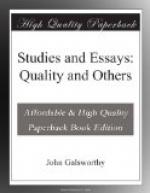I ordered three pairs, though I had only wanted two, and quickly left. I had, I do not know quite what feeling of being part, in his mind, of a conspiracy against him; or not perhaps so much against him as against his idea of boot. One does not, I suppose, care to feel like that; for it was again many months before my next visit to his shop, paid, I remember, with the feeling: “Oh! well, I can’t leave the old boy—so here goes! Perhaps it’ll be his elder brother!”
For his elder brother, I knew, had not character enough to reproach me, even dumbly.
And, to my relief, in the shop there did appear to be his elder brother, handling a piece of leather.
“Well, Mr. Gessler,” I said, “how are you?”
He came close, and peered at me.
“I am breddy well,” he said slowly “but my elder brudder is dead.”
And I saw that it was indeed himself—but how aged and wan! And never before had I heard him mention his brother. Much shocked; I murmured: “Oh! I am sorry!”
“Yes,” he answered, “he was a good man, he made a good bood; but he is dead.” And he touched the top of his head, where the hair had suddenly gone as thin as it had been on that of his poor brother, to indicate, I suppose, the cause of death. “He could nod ged over losing de oder shop. Do you wand any hoods?” And he held up the leather in his hand: “Id’s a beaudiful biece.”
I ordered several pairs. It was very long before they came—but they were better than ever. One simply could not wear them out. And soon after that I went abroad.
It was over a year before I was again in London. And the first shop I went to was my old friend’s. I had left a man of sixty, I came back to one of seventy-five, pinched and worn and tremulous, who genuinely, this time, did not at first know me.
“Oh! Mr. Gessler,” I said, sick at heart; “how splendid your boots are! See, I’ve been wearing this pair nearly all the time I’ve been abroad; and they’re not half worn out, are they?”
He looked long at my boots—a pair of Russia leather, and his face seemed to regain steadiness. Putting his hand on my instep, he said:
“Do dey vid you here? I ’ad drouble wid dat bair, I remember.”
I assured him that they had fitted beautifully.
“Do you wand any boods?” he said. “I can make dem quickly; id is a slack dime.”
I answered: “Please, please! I want boots all round—every kind!”
“I will make a vresh model. Your food must be bigger.” And with utter slowness, he traced round my foot, and felt my toes, only once looking up to say:
“Did I dell you my brudder was dead?”
To watch him was painful, so feeble had he grown; I was glad to get away.
I had given those boots up, when one evening they came. Opening the parcel, I set the four pairs out in a row. Then one by one I tried them on. There was no doubt about it. In shape and fit, in finish and quality of leather, they were the best he had ever made me. And in the mouth of one of the Town walking-boots I found his bill.




